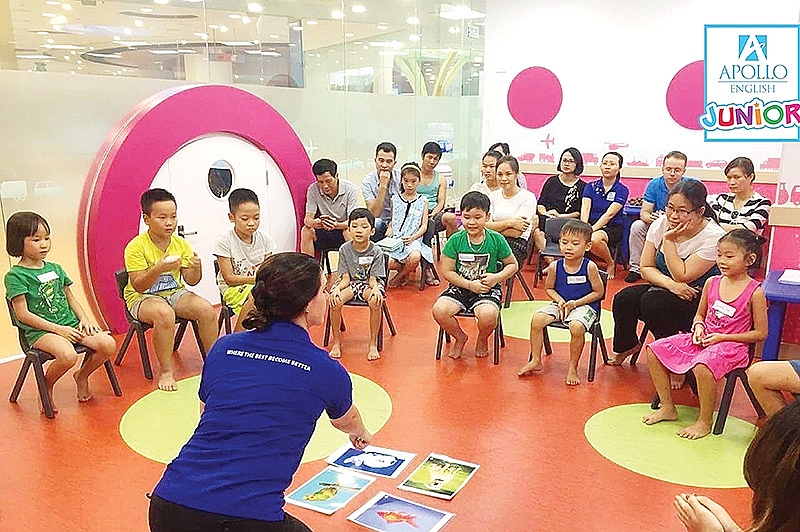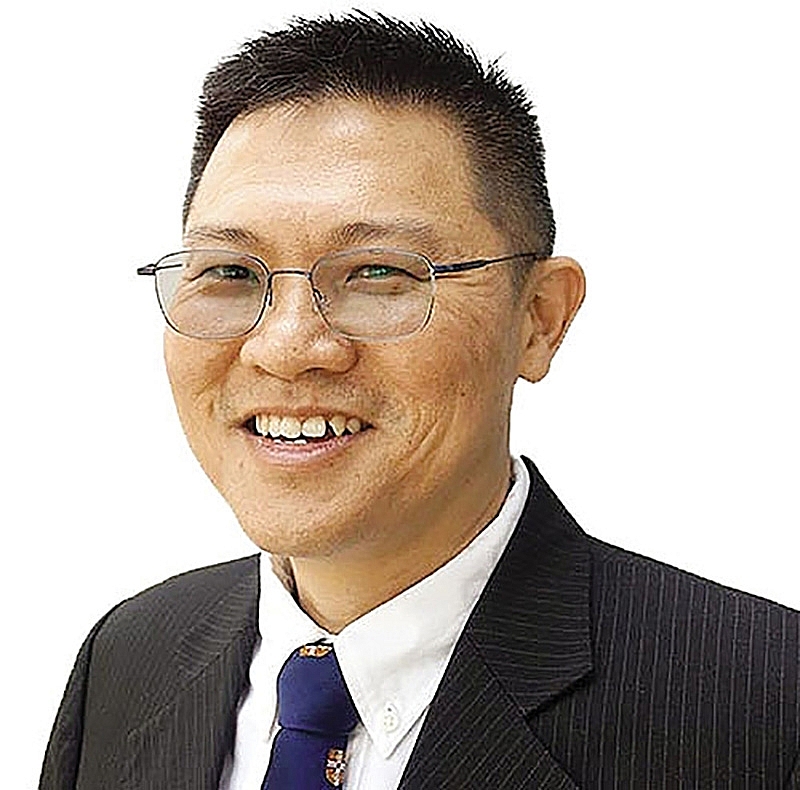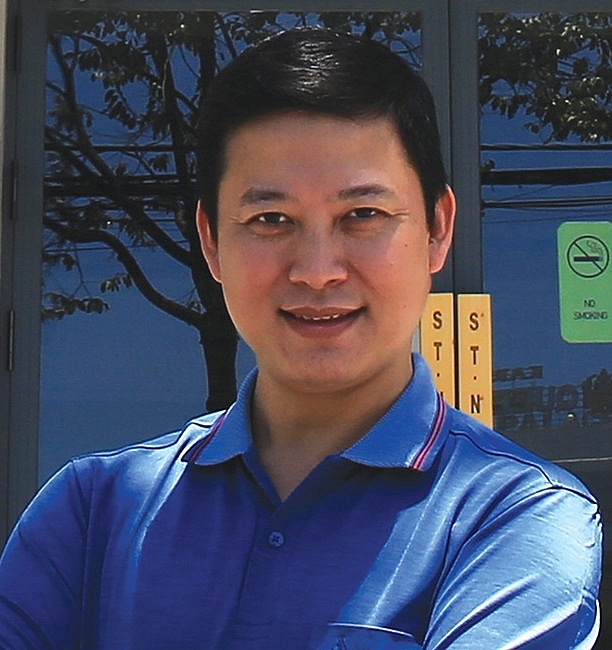Private schools demand help through uncertainty
 |
| Nearly all educational establishments across Vietnam have been closed since Lunar New Year Photo: Le Toan |
Last week, 150 private education institutes filed a document to the government and relevant ministries, calling for help in avoiding interruptions in their business.
“We are exhausted in that there is no specific timeline to allow students to come back to school,” the document said. “During this period, we have to pay full salaries to teachers and employees as well as make payments on bank loans and land or facility leasing. We are nearly running out of financial capacity, energy, and mental health.”
All of these schools, which include kindergartens up to colleges, as well as foreign language centres, explained that they will be brought to ruin unless receiving support from the government.
They forecasted that if the epidemic lasts until June, 80 per cent of non-public schools will lose at least 50 per cent revenue, and up to 90 per cent will go bankrupt due to the imbalance of revenue and expenditure.
According to the document, the average cost to open a language teaching institute is about VND2-5 billion ($87,000-217,000), based on a minimum of 30 staff.
Developing a school requires an average investment of VND80-200 billion ($3.5-8.7 million), in which bank loans are significant. Such establishments can only suffer the risk for three months, the document attested.
Discussing with VIR about the issue, economist Nguyen Tri Hieu said that the performance of most private schools is usually at break even point, leading to steady loss of liquidity. Furthermore, with a lending rate of 9-11 per cent annually, small-scale schools are unable to pay. “If the deadlock keeps lasting, their bankruptcy will be foreseen,” Hieu said.
A cry for help
One educator who wished to be unnamed told VIR that newly-founded schools are in a tight fix. School revenues in normal conditions usually covers about 50 per cent for teacher salaries, 20 per cent for land and facility leasing costs, 10 per cent for water and electricity costs, and 10 per cent on bank loans, with only 10 per cent for their profits.
“As a result, annual profits only cover one month without income,” said the educator.
Therefore, schools with a few years of operation cannot maintain their performance if lacking the earnings within a couple of months.
However, the move from schools with supposedly great financial potential and long experience such as as Apollo, Apax English, Equest, and Newton Grammar School, has surprised educators, who are finding it hard to believe that the health crisis could so easily put them on edge. “This cry for help seems to be inappropriate,” said one expert.
According to the document sent to the government, Apollo Vietnam runs 42 branches, about 20,000 students, and 800 employees across the country. Apax English is in no way inferior with 130 branches, 120,000 students, and 6,000 employees. Additionally, Equest also manages more than 80,000 students and 2,000 workers.
Nguyen Kim Dung, head of Apollo Vietnam’s Legal, Compliance, and Government Relations department said, “Similar to other businesses, we have to ensure the balance between earnings and costs. However, as revenue from teaching activities has been interrupted, other expenses are maintained. This is the big impact we face if the epidemic keeps lasting.”
ILA Vietnam and KDI Education also asked the government for help despite their large-scale operation. ILA is driving 46 branches and 30,000 students, while KDI’s performance depends on 68 branches and 35 students.
Newton Grammar School has operated for more than 10 years with 4,000 students, 600 staff members, and three branches in Hanoi, while kindergarten system STEAMe GARTEN is also in charge of 13 branches and 3,000 pupils.
Despite claiming vast spending to pay for teachers, major schools have significantly cut salaries of teachers since early February due to the outbreak and closure of facilities. That has led onlookers to believe that expenditure in this area is not the great burden some schools insist, while other expenses are consequently narrowed massively.
Moreover, a representative of Vietnam-Australia School in Hanoi told VIR that major schools should not face such difficulties because any institute in operation should have set provisions to prevent unexpected risks. “Our expenditure, for example, could help us survive at least one year without any earnings,” the representative insisted.
Calling for responsibility
Otherwise, schools with less experience like Everest, despite experiencing hardship, have yet to voice any backing for the move to ask for government help. “We acknowledge the huge damage that we are experiencing, but now we choose to accompany the government to overcome the challenge. Any compensation should be calculated after the epidemic is gone,” Everest chairman Tran Kim Phuong told VIR.
Stressing the importance of schools’ social responsibilities, the educator said that the health crisis is a common hazard of society, and therefore joining hands to pass the obstacle is the best action for all businesses.
Phuong said that their teachers still get salaries of two months, similar to the payment received during the two months of summer. On the other hand, the school will use the time to keep teaching the year’s curriculum instead of organising extracurricular activities.
“Hence, we accept losing a sizeable income from holiday courses as a sharing with the common dilemma,” he added. “Schools should find ways to adapt instead of waiting for the government’s backing,” economist Hieu concluded. “The government cannot make up the shortage in their revenue.”
| Melvyn Lim - Vietnam manager Cambridge Assessment International Education
Amidst the COVID-19 outbreak, most private schools have been put into a corner. Every category of school is impacted by the health crisis, be it state, private or international schools. Specifically, they have reduced face-to-face teaching and learning time, forcing students have to access online learning despite some obstacle in computer and internet access. Moreover, by applying e-learning, some teachers may face challenges in delivering programmes for students because the model is still uncommon in Vietnam. Additionally, financial issues of paying teachers and other staff is also a big concern when schools are closed. On the plus, the situation of school closures is forcing the rapid adoption of e-learning which has its own advantages. Schools may have previously gotten an online learning system but not all were using it regularly or prominently prior to the mandated school closure. We are supporting schools in Vietnam by extending examination registration deadlines and also allowing schools to submit certain coursework components at a later date than usual. There are other measures of support that we are providing which are communicated directly to our schools. Nguyen Tuan Hai - CEO, Mudd Harvey JSC (St. Nicholas School)
The layoff of schools has greatly affected the country’s educational system. Students have been absent from school for over month now, with studies being seriously interrupted. St. Nicholas School is operated by a foreign partner who is coping with the collapse in order to remedy the problem. The suspension makes the lives of teachers and other staff at St. Nicholas School uncertain. We had to cut their salaries and other policies, which unfortunately made their lives even more difficult. While the school’s revenue is nearly frozen, expenses are still occurring as usual. Our school applies online learning plans on both technology platforms such as Skype and the internal academic management system with our overseas partner. Students and teachers can interact with each other, and review and exchange knowledge, as well as carry out homework by using the system. Of course, these are temporary solutions amid the epidemic which are rather limited. While we regard e-learning as one of our training channels, it cannot replace direct interaction between students and teachers like in traditional classes. In my opinion, e-learning is more suitable for higher education like universities and postgraduate studies, not so much for primary, secondary, or high schools, as one of our most important priorities lies on the personality and character development of our students. In order to prepare for a time when students return to school, we are currently working closely with state management agencies to implement prevention and control measures under the directions of the people’s committees, the departments of Education and Training, and the departments of Health. We disinfect and spray the entire campus continuously and have fully equipped all facilities with medical masks, disinfectant, and hand sanitiser, as well as electronic temperature meters. |
What the stars mean:
★ Poor ★ ★ Promising ★★★ Good ★★★★ Very good ★★★★★ Exceptional
Themes: COVID-19
- 67 million children missed out on vaccines because of Covid: UNICEF
- Vietnam records 305 COVID-19 cases on October 30
- 671 new COVID-19 cases recorded on October 1
- Vietnam logs additional 2,287 COVID-19 cases on Sept. 21
- People’s support decisive to vaccination coverage expansion: official
Related Contents
Latest News
More News
- VNPAY and NAPAS deepen cooperation on digital payments (February 11, 2026 | 18:21)
- Vietnam financial markets on the rise amid tailwinds (February 11, 2026 | 11:41)
- New tax incentives to benefit startups and SMEs (February 09, 2026 | 17:27)
- VIFC launches aviation finance hub to tap regional market growth (February 06, 2026 | 13:27)
- Vietnam records solid FDI performance in January (February 05, 2026 | 17:11)
- Manufacturing growth remains solid in early 2026 (February 02, 2026 | 15:28)
- EU and Vietnam elevate relations to a comprehensive strategic partnership (January 29, 2026 | 15:22)
- Vietnam to lead trade growth in ASEAN (January 29, 2026 | 15:08)
- Japanese business outlook in Vietnam turns more optimistic (January 28, 2026 | 09:54)
- Foreign leaders extend congratulations to Party General Secretary To Lam (January 25, 2026 | 10:01)



 Tag:
Tag:




















 Mobile Version
Mobile Version